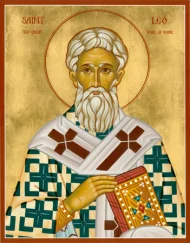 The energy of the Holy Spirit, which we have already mystically received in baptism, is realized in two ways.
The energy of the Holy Spirit, which we have already mystically received in baptism, is realized in two ways.
First – to generalize – this gift is revealed, as St Mark tells us, through arduous and protracted practice of the commandments: to the degree to which we effectively practice the commandments its radiance is increasingly manifested in us.
Secondly, it is manifested to those under spiritual guidance through the continuous invocation of the Lord Jesus, repeated with conscious awareness, that is, through mindfulness of God.
In the first way, it is revealed more slowly, in the second more rapidly, if one diligently and persistently learns how to dig the ground and locate the gold.
Thus if we want to realize and know the truth and not to be led astray, let us seek to possess only the heart-engrafted energy in a way that is totally without shape or form, not trying to contemplate in our imagination what we take to be the figure or similitude of things holy or to see any colors or lights. For in the nature of things the spirit of delusion deceives the intellect through such spurious fantasies, especially at the early stages, in those who are still inexperienced.
On the contrary, let our aim be to make the energy of prayer alone active in our hearts, for it brings warmth and joy to the intellect, and sets the heart alight with an ineffable love for God and man. It is on account of this that humility and contrition flow richly from prayer.
For prayer in beginners is the unceasing noetic** activity of the Holy Spirit. To start with it rises like a fire of joy from the heart; in the end it is like light made fragrant by divine energy.
There are several signs that the energy of the Holy Spirit is beginning to be active in those who genuinely aspire for this to happen and are not just putting God to the test – for, according to the Wisdom of Solomon, it is found by those who do not put it to the test, and manifests itself to those who do not distrust it (cf. Wisd. 1:2).
In some it appears as awe arising in the heart, in others as a tremulous sense of jubilation, in others as joy, in others as joy mingled with awe, or as tremulousness mingled with joy, and sometimes it manifests itself as tears and awe. For the soul is joyous at God’s visitation and mercy, but at the same time is in awe and trepidation at His presence because it is guilty of so many sins.
Gregory of Sinai (1260s–1346): On the Signs of Grace and Delusion 3-4, Text from G.E.H. Palmer, Philip Sherrard, and Kallistos Ware (trans. and eds.) The Philokalia: The Complete Text, vol. 4 (Faber & Faber, London & Boston: 1979ff), pp. 259-260.
** noetic = relating to the nous. The translators of the Philokalia say the following about the word nous: as used in this passage from Gregory and by other Greek authors: INTELLECT (nous): the highest faculty in man, through which – provided it is purified – he knows God or the inner essences or principles of created things by means of direct apprehension or spiritual perception. Unlike the dianoia or reason, from which it must be carefully distinguished, the intellect does not function by formulating abstract concepts and then arguing on this basis to a conclusion reached through deductive reasoning, but it understands divine truth by means of immediate experience, intuition or ‘simple cognition’ (the term used by St Isaac the Syrian). The intellect dwells in the ‘depths of the soul’; it constitutes the innermost aspect of the heart (St Diadochos). The intellect is the organ of contemplation, the ‘eye of the heart’ (Macarian Homilies).









Outstanding. I like this: “For prayer in beginners is the unceasing noetic** activity of the Holy Spirit” – but I really like that commentary on the **Noetic – a brilliant treatment of Spiritual Cognition.
Thank you. The commentary comes from the translators – most probably from Met. Kallistos Ware
I have looked at the work of the translators before – I think there is a wrong assignation of “dianoia” – in the exchange of views in Mark 12:28-33 the scribe uses the word “sunesis” – ‘understanding’ as in rational abstract discursive intellect and Jesus uses the word translated as ‘mind’ – dianoia – in the context of relational Heart knowledge (dianoia – literally: knowing through the Heart or “spiritual discernment/knowledge/wisdom/understanding”) – Spiritual Cognition. The general principles expressed by Timothy Ware et.al. are great but I still hold the view that Jesus intentionally links the conceptual framework of “dianoia” to Heart Knowlege.
Where we are in agreement is that the human spirit has a noetic-communicative faculty which has coinherent empathetic properties or abilities or the capacity for “empathetic communion or relationship”.
I would imagine that “dianoia” has a range of meanings in patristic literature, and that different writers use it in quite different ways – including the Platonic sense of “rational discursive intellect” and the Biblical sense of “relational heart knowledge”. . I agree with you about the meaning of “dianoia” in Mark 12:28-23; and Luke 1:51 clearly relates “dianoia” to the heart (albeit in a negative context).
The other thing I think is important is to understand the relational “indwelling” person of the Holy Spirit in the Hearts of Christian and not just the “energetic transference” of His indwelling presence. Both are noetic-communcative encounters – but the first sees the ways of God and the second responds to the acts of God cf. He made known His ways to Moses, [but only] His deeds to the people of Israel…
Mark
Can we agree that there is a general Patristic consensus on the problem of a “darkened Nous” which I believe Luke 1:51 addresses with the reference to Dianoia – one recent commentator made this acute observation:
“..after the Fall the nous became hidden by the passions, was overcome by darkness, and the intelligent aspect of the soul rose above the nous to usurp the nous’ position as the dominant inner force. The nous sickened, or darkened, and the soul’s intelligent power assumed the role as man’s source of existence”.
Yes, I think that’s an excellent summary of the patristic understanding of the problem of the “darkened nous”.
One final thing – one of the problems I had and do have with academic scholasticism was and is the “Soulish tendency” to emphasis the rational discursive intellect above the noetic faculties of the human spirit – where Sergei Sakharov and I met was at the point where we had both experienced our minds being drawn back out of our hearts….it is a struggle…and I confess that….keeping my rational discursive mind in subjection to my human spirit (my heart in relational-affective terms of reference) in the Lord Jesus Christ or ‘keeping my mind in my heart’ is a daily discipline….